- Home
- Elizabeth Hunter
Beneath a Waning Moon: A Duo of Gothic Romances Page 2
Beneath a Waning Moon: A Duo of Gothic Romances Read online
Page 2
“Mr. Shaw,” Declan interrupted. “While I am sure your daughter is a most agreeable young woman, I do not know her, nor does she know me. Surely she would not consent to this.”
“She would if you charmed her,” Shaw said. “As if all of Dublin doesn’t know of the Murphy brothers’ charm! Surely, Mr. Murphy, you could persuade her. I would not try to hide my machinations, of course. But she’s a practical girl, my Jo.” Shaw grimaced. “When she wants to be.”
Tom’s mind was racing. Courts could be unpredictable, especially when it came to issues of inheritance. Wills could be contested. And Beecham was always sniffing around Murphy, watching the younger vampire with jealous eyes. He would use any excuse—manipulate any connection—to thwart Murphy, though he couldn’t do it openly.
Shaw was right. If Declan married the Shaw heiress, it would solve everything. Murphy would buy Shaw’s businesses without argument. Shaw would be seen as handing over the reins to his daughter’s new family. Not even Beecham would be able to manipulate Murphy’s claim to the boat works.
And when the girl died… it wasn’t as if she didn’t have a fortune of her own. In a way, marriage to the Shaw spinster would mean they were getting Shaw’s businesses for little less than the cost of a wedding and care for a consumptive.
But Declan looked as if he were steps away from execution.
Ninny.
Murphy also saw the terrified look on his brother’s face and leaned forward. “John, as much as I want to buy your factories, I cannot force my brother—”
“I’ll do it,” Tom said quietly. “If Miss Shaw would consent to marry me, I will wed her.”
Wide eyes turned toward Tom.
“But only if she consents,” he said again. “I won’t force the girl or put up with having her coerced. From what you’ve said, Miss Shaw has little enough time left without her being miserable in a marriage she doesn’t want.”
Murphy’s mouth was gaping open. Declan finally took a breath. And John Shaw was smiling.
“Good man,” Shaw said.
Tom nodded, uncomfortable being the center of their attention. “Don’t be too certain she’ll accept me. She’s the one who’ll have to look at this ugly mug every night.”
“Tom,” Murphy said. “You don’t have to do this. Shaw, I promise we will ensure your daughter—”
“It’s little enough, Murphy.” Tom glanced at Shaw, interrupting his sire before he could offend their host. “Little enough to ensure the protection of a young woman. I’m no prize. But if she’ll have me, I’ll have her.”
Murphy looked at Tom a long time until Tom looked his sire in the eye and nodded. Murphy’s shoulders relaxed and he turned to Shaw. “John, why don’t you talk to your daughter first. We can wait to have my solicitor draw up the paperwork. Perhaps you could arrange a dinner sometime this week so my brother and your daughter could meet? I think we’d all like to meet Miss Shaw.”
“CHRIST, Tom. Did you have to go and offer for the spinster?” Declan stormed into the room while Murphy and Tom were throwing back a pint of ale. Declan had stayed behind, talking to Shaw’s family solicitor.
“Did you have to act like marrying the woman was such a torture?” Tom asked. “You’d have thrown the whole deal off with your clumsy excuses, Dec.”
His brother pointed at him. “You’ve no business marrying the girl. Sure, we can fool Shaw and avoid the daylight when we do business with him, but have you thought about the consequences of trying to fool a wife? She’ll have a staff. Servants. What the hell do you think you’re going to do?”
“Be very careful,” Murphy said. “This is Tom, Declan. Who’s more careful than Tom?”
Tom didn’t feel very careful, and for the first time in thirty years, he wished he could fall into the sweet oblivion liquor had once brought him and not just taste it. For the first ten years of immortality, it had haunted him. He still had all the same reasons to drink with none of the relief alcohol had once afforded.
When he’d finally turned his mind to controlling the baser urges that had driven him as a human, he’d found some peace. Now he was voluntarily taking on the care of a wife. A sick wife. He had no business taking care of anyone, much less a sick spinster.
Murphy looked at him with an expression that said he could hear all Tom’s doubts rising to the surface. “It’ll be fine, Tom,” his sire said. “If you need to, you can touch her mind. Or have Anne do it. She has the most control.”
“Jayzuz,” Declan groaned. “What’s Anne going to say? She’ll have your head for this, Murphy.”
“She’ll not,” Tom said. “I’m the one that put us all in this by offering. I’ll tell Anne.”
None of them wanted to anger Murphy’s mate. She was the glue that held their small family together. But Tom knew she’d be keen to protect a vulnerable human woman, even if it meant inconvenience for the rest of them for a couple of years. Anne had a soft heart.
“I’m going out,” Tom said, placing his glass carefully on the bar in Murphy’s office.
“I saw some of Beecham’s crew on the way here,” Declan said. “Be careful. They’re sniffing.”
Murphy had taken the space near the docks because Beecham never dirtied his fine leather shoes by the waterfront. Their crew could operate with some amount of discretion there away from the finer eyes of Dublin immortal society and the corruption of its lord.
And Tom’s upcoming marriage might blow that all to hell.
“Don’t think of it,” Murphy said, reading Tom’s mind. “We always knew we’d attract attention with a move to take over Shaw’s boat works. There was no avoiding this. Marriage to the Shaw girl won’t make that any better or worse.”
Declan shrugged. “At least she’s not popular in society. She won’t have to explain your lack of social graces. I inquired discreetly after you both left. The woman is practically an invalid. Twenty-eight years old, but her health started failing soon after she came out in society. Most of her education was in England. She maintains correspondence but hardly leaves the grounds unless she’s going to their house by the sea for her lungs. Very few callers. No one mentioned her looks, which means she’s plain. Probably dim too. Otherwise she’d have an offer of marriage, even if she was on the edge of death, solely for her fortune.” Declan laughed. “Probably more than one.”
“She went to school,” Tom said, already feeling protective of the lady. “I highly doubt any daughter of Shaw’s is a dullard. Besides that, how do you know she hasn’t had an offer? Shaw said she never wanted a husband. Said she was ‘independent.’”
He found himself admiring her for it, even though independent might be polite society code for foolish and stubborn. As long as the girl had her wits, Tom wouldn’t be miserable. He could respect a stubborn woman. He was no pushover himself.
“Why don’t we all withhold judgment until we’ve met the woman?” Murphy said. “If she’s anything like her father, I expect she and Tom will get along well. The details can be worked out in time. Tom, take your walk if you’ve a mind, but keep an eye out for Beecham’s lads.”
“Will do, boss.”
Tom left the warehouse, slipping down the back alleys along the river and heading south toward the Shaws’ fine house on Merrion Square. He had a mind to watch it. Why? He didn’t exactly know.
He wasn’t in any kind of rush, so he stretched the walk out for an hour or so, plenty of time for most of the city to fall asleep. Tom liked the silence. He was a quiet man and always had been, even in human life. It was hard enough to avoid gathering notice when you were over six feet tall and built like a brick wall, as his mam had told him. He was only ever going to be a brute with size like that.
It was pure luck he’d fallen into boxing as a human. More luck that when his own body had started to give out, he’d run into a brash young Traveller who needed coaching and a companion to watch his back. Tom Dargin had thrown in with Murphy within weeks of meeting the young man, seeing in him the kind of luck Tom
had always admired but never captured.
And now he’d be marrying a proper society woman if that woman would have him.
Wasn’t life unexpected?
He lurked across the way from the Shaw house, surprised by the number of lights still on inside. Comfortable in the shadows, he crossed the main thoroughfare on the north side of the square and walked down a side street, curious to see if the Shaws’ garden was accessible. He wanted to know who was awake. Who would be using gas lamps so late at night? Surely not one of the servants. Was it old Mr. Shaw himself, worried about his company and his failing health? Or perhaps it was Miss Shaw, unable to sleep or discomforted by her illness.
Either way, Tom was curious. And a curious Tom was a stubborn thing.
He walked across the muddy road behind the house where delivery carts had left deep grooves in the mud. A light mist was falling, and he drank it in, replete with the surge of power it lent his amnis. Unlike Murphy, who preferred fresh water, Tom felt most at home near the sea. But any water would do. He’d never been a particular man.
Following the lights led him past numerous walled gardens until he finally arrived at the back side of the stately redbrick Georgian home belonging to John Robert Shaw. It was handsome but not ostentatious. Respectable but not ancient. He’d watched Shaw exit the front of the house on more than one night, but he’d never investigated the gardens. Declan might have looked through the Shaw books, but it was Tom who gathered information on the ground.
That night, Tom Dargin scaled the garden wall and dropped into another world.
Far from the well-tended, orderly garden he’d imagined from Shaw’s tidy appearance, this garden was a wild tangle of trees and flowers. Statuary hid among rocks tumbled artfully around the bases of trees, giving the dark garden a fantastical appearance. A miniature glass house lit up the center of the lawn, sparkling from the inside with candlelight. Tom felt as if he’d slipped into one of the fairy stories his grandmother had been fond of telling.
For standing in the center of a lush lawn, dressed in a white dressing gown, was a tall woman, as willowy as the trees that lined the garden. She stood, swaying a little, her pale skin touched by the moon’s silver light as she held a book in her hand and turned in place. Her feet were bare, her dark hair fell past her waist, and her long gown was drenched in the evening dew.
It must be Miss Shaw. No servant would take a book out into the garden in the middle of the night. Certainly not in their dressing gown.
“‘But dreams come through stone walls…’” She held up the book to the moon’s light and spoke quietly, though his immortal hearing could pick up the words easily. “‘…light up dark rooms, or darken light ones, and their persons make their exits and their entrances as they please, and laugh at locksmiths.’”
She twirled on the lawn, lifting the book over her head and humming a tune as her hair lifted while she spun.
“Dreams come through stone walls…,” she whispered into the night as Tom watched from the dark shelter of a drooping willow.
“Oh, feck me,” he muttered under his breath, letting out a sigh. “She’s mad as a March hare.”
Chapter Two
JOSEPHINE ROBERTA DOYLE SHAW was a practical woman. Despite her rather eccentric writings, she ran her father’s household with quiet efficiency, though she was wise enough to bow to the expert opinion of Mrs. Morse, the housekeeper her mother had hired before her untimely—and, Josephine preferred to think, tragic—death. As her mother had died in childbirth, Josephine had never felt her loss, though she liked to imagine she and her mother would have been the closest of confidantes and the dearest of friends.
As it was, Eloisa Shaw had left her daughter with an excellent and loving nanny, an efficient housekeeper, and an extensive and not-at-all proper library with books in Italian, French, and Spanish, as well as all the more conventional writings. This had motivated Josephine to excel early in languages, and by the time she was thirteen, she could explore the forbidden tomes her mother had left behind.
Josephine had not been disappointed.
As well as firing her imagination in very improper ways, her mother’s own notes in the margins of the most scandalous books gave Josephine a peek into the mind of the woman she must have been.
Which was why when she embarrassed her father—as she inevitably did—Josephine reminded him that he had been the one to marry Eloisa Francesca Dioli Doyle in the first place. Therefore, if any scandal resulted from her reading Italian romances and French philosophy, it was entirely his own fault.
She was sitting in her library when her father presented his latest idea to ensure her future.
“You want me to what?” she said, laughing lightly so as not to provoke her lungs. “Marry him? One of your business partner’s brothers?”
He leaned toward her, her gentle father who had always indulged her every whim. If she were a petulant child, he would have ruined her. Luckily, Josephine was eminently good-natured and had been blessed with a very strict nanny.
“Jo, you know you must.”
“No, I don’t know I must. Father, in addition to the rather large fortune you have worked very hard for, I also have my own income, modest though it may be. I will never be destitute. You are fretting for nothing.”
“And when I die? When your cousin tries to take the house?”
She shrugged. “He could try. But if you should pass before me—though I think you are not quite as ill as you imagine—I will sell the house to some eager buyer with Mr. Macon’s help, then I shall take Mrs. Porter and Mrs. Morse with me to the house in Bray. You know I don’t like society.” She let a sad smile touch her lips. “And you know it will not be for long. I am happy as I am.”
“But if you were married…” He sighed. “Jo, I would worry so much less.”
“I know.”
The soft pang in her chest was not only from the tuberculosis that plagued her. For though Josephine Shaw was a practical woman, she also had the fiery heart of a romantic. It wasn’t that she’d never longed for love. She had. When she was younger, she’d longed most desperately! But she’d known by the age of twenty-three that her health was becoming more and more fragile. And by twenty-five that the doctors’ treatments would not save her life. It seemed cruel to hope for any happiness besides her own small fancies.
She wrote her stories, and they were read and enjoyed—or so Lenore claimed—by many. Josephine enjoyed quiet society and music and books and gardening. She loved her father to distraction.
It was with that love in mind that she took his hand. “Father, I promise I will be fine.”
She tried to ignore the tears in the corners of his eyes when he squeezed her hand tightly.
“You deserve much more than ‘fine,’ my dear girl. You deserve a love like your mother and I had. I only had her for four years, but it has been enough to sustain me for twenty-nine.”
“And do you think I will find love in an arranged marriage?” She had to smile. “You cannot make a young man love me because you do. I do not think that is the way love works.”
“If he only meets you, he will have to love you.”
“Oh, Papa!” Josephine laughed harder, and she couldn’t stop the cough that followed. She muffled it in the handkerchief Lenore had embroidered for her. No blood—thank God—yet. “I think you are biased in my favor, but I will take the compliment. Surely Mr. Murphy will love me on sight. But shall I love him? This young man who would agree to a marriage to seal a business deal for his brother? No doubt he sees in our marriage a way to make his own fortune. Not that I begrudge ambition, but it doesn’t lend itself to romance, does it?”
Shaw looked thoughtful. “If it was Declan Murphy, I might say you have the right of it, my dear. But it is not. Mr. Thomas Murphy, the oldest of the brothers, has offered for you.”
“The oldest, is it?” Josephine quipped. “Well then, I might have a chance to outlive him after all.”
Her father was abashed. “Not
as old as that. But he is… a mature man. Perhaps in his forties. Not overly talkative. Not a pretty fellow at all, I suppose. Though I’ve noticed the serving girls all take note of him.“
Josephine nodded solemnly. “I do bow to the measured opinion of observant serving girls when I consider suitors.”
Shaw let go of her hand and leaned back, crossing his legs and brushing a hand over his trouser leg. “You’re teasing your father.”
She smiled. “It’s just so silly. Why do I have need of a husband?”
“To protect you.”
“I can protect myself. Or set the dogs on the marauders if they ignore my shrill and desperate cries.”
His lips twitched with a smile. “To make you happy.”
“You have no guarantee this Thomas Murphy is capable of that.”
“Fine.” He took her hand again. “To give your poor papa a measure of peace that I will leave you secure. I don’t have long, Jo. I know that. If the Tetleys lived in Dublin, I would have no worry in your situation, for I know Margaret and Daniel love you as their own. But they do not live here, and you are not well enough to travel so far. All I am asking is that you give this man a chance to win your regard.”
Josephine paused, persuaded by her father’s worried pleas. “Very well, I will meet him.”
“That is all I am asking.”
“But if he thinks this union is somehow assured—”
“Mr. Murphy specifically said he would have you only if you would have him. He was quite clear that any kind of coercion on my part was unacceptable.”
“Oh.” That was… rather thoughtful. “I appreciate his regard in that matter.”
“Meet him, Jo. You never know. Thomas Murphy may not be one of your romance heroes, but you might find him far more to your liking than you expect.”
My dearest Miss Tetley,
You will be most astonished to find not only the pages of Mr. Doyle’s latest horror enclosed, but also news of an even more alarming nature.

 A Hidden Fire
A Hidden Fire The Silent
The Silent The Secret
The Secret A Ghost in the Glamour: A Linx & Bogie Story
A Ghost in the Glamour: A Linx & Bogie Story Waking Hearts
Waking Hearts The Scribe
The Scribe Midnight Labyrinth
Midnight Labyrinth Desert Bound
Desert Bound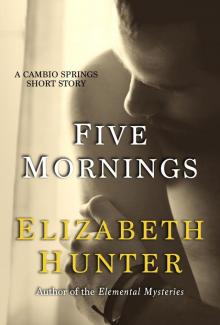 Five Mornings
Five Mornings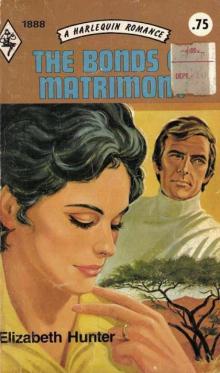 The Bonds of Matrimony
The Bonds of Matrimony The Force of Wind
The Force of Wind Imitation and Alchemy
Imitation and Alchemy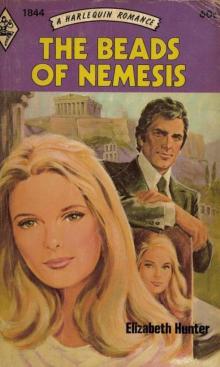 The Beads of Nemesis
The Beads of Nemesis Shifting Dreams
Shifting Dreams The Bronze Blade
The Bronze Blade Hooked
Hooked The Storm
The Storm The Scarlet Deep
The Scarlet Deep Long Ride Home
Long Ride Home Valley of the Shadow: An Elemental World Novella
Valley of the Shadow: An Elemental World Novella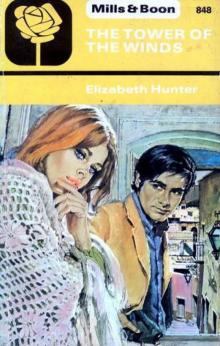 The Tower of the Winds
The Tower of the Winds The Staff and the Blade
The Staff and the Blade Omens and Artifacts
Omens and Artifacts The Devil and the Dancer
The Devil and the Dancer The Seeker
The Seeker Waterlocked
Waterlocked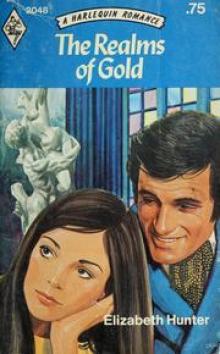 The Realms of Gold
The Realms of Gold A Bogie in the Boat
A Bogie in the Boat Night's Reckoning
Night's Reckoning Blood and Sand
Blood and Sand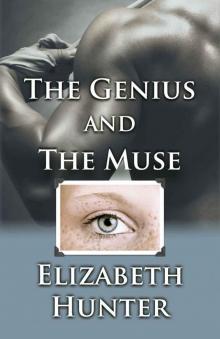 The Genius and the Muse
The Genius and the Muse Night’s Reckoning: An Elemental Legacy Novel
Night’s Reckoning: An Elemental Legacy Novel Psychic Dreams: A Paranormal Women's Fiction Novel (Glimmer Lake Book 3)
Psychic Dreams: A Paranormal Women's Fiction Novel (Glimmer Lake Book 3) This Same Earth
This Same Earth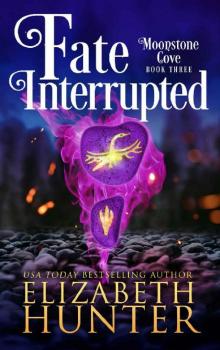 Fate Interrupted: A Paranormal Women's Fiction Novel (Moonstone Cove Book 3)
Fate Interrupted: A Paranormal Women's Fiction Novel (Moonstone Cove Book 3) Blood Apprentice: An Elemental Legacy Novel
Blood Apprentice: An Elemental Legacy Novel Valley of the Shadow
Valley of the Shadow The Devil and the Dancer: An Elemental Legacy Novella
The Devil and the Dancer: An Elemental Legacy Novella The Stars Afire: An Elemental Mysteries Anthology
The Stars Afire: An Elemental Mysteries Anthology Dawn Caravan
Dawn Caravan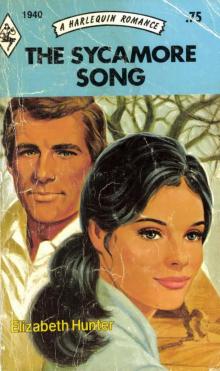 The Sycamore Song
The Sycamore Song The Singer
The Singer Dawn Caravan: Elemental Legacy Book Four (Elemental Legacy Novels 4)
Dawn Caravan: Elemental Legacy Book Four (Elemental Legacy Novels 4) Hooked: A Love Story on 7th and Main
Hooked: A Love Story on 7th and Main A Ghost in the Glamour
A Ghost in the Glamour Grit: A Love Story on 7th and Main
Grit: A Love Story on 7th and Main The Stars Afire
The Stars Afire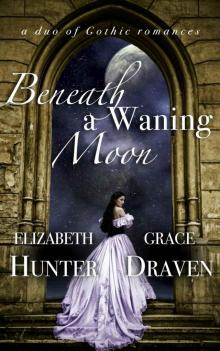 Beneath a Waning Moon: A Duo of Gothic Romances
Beneath a Waning Moon: A Duo of Gothic Romances Midnight Labyrinth: An Elemental Legacy Novel
Midnight Labyrinth: An Elemental Legacy Novel All the Stars Look Down: A Duo of Christmas Romances
All the Stars Look Down: A Duo of Christmas Romances The Scribe ic-1
The Scribe ic-1 INK
INK